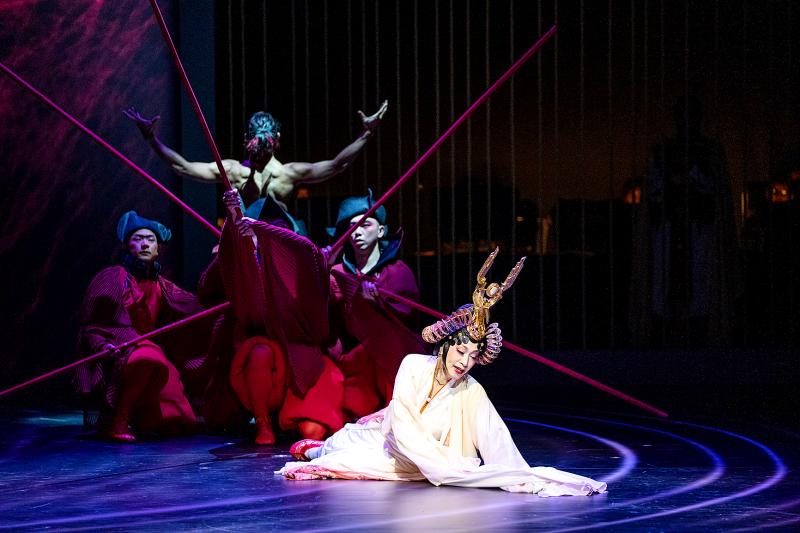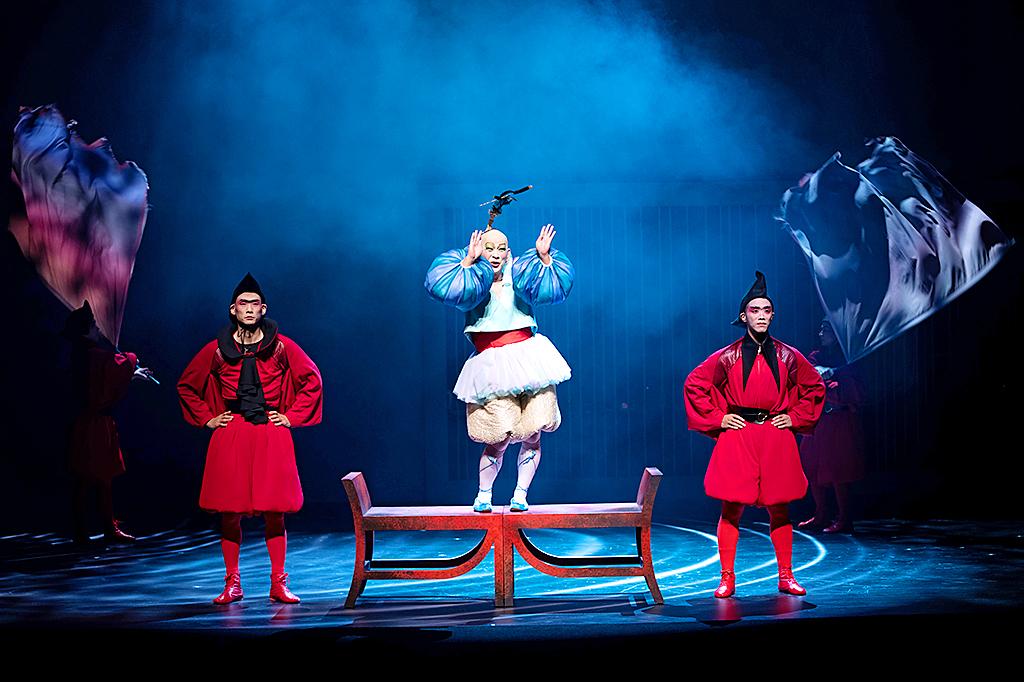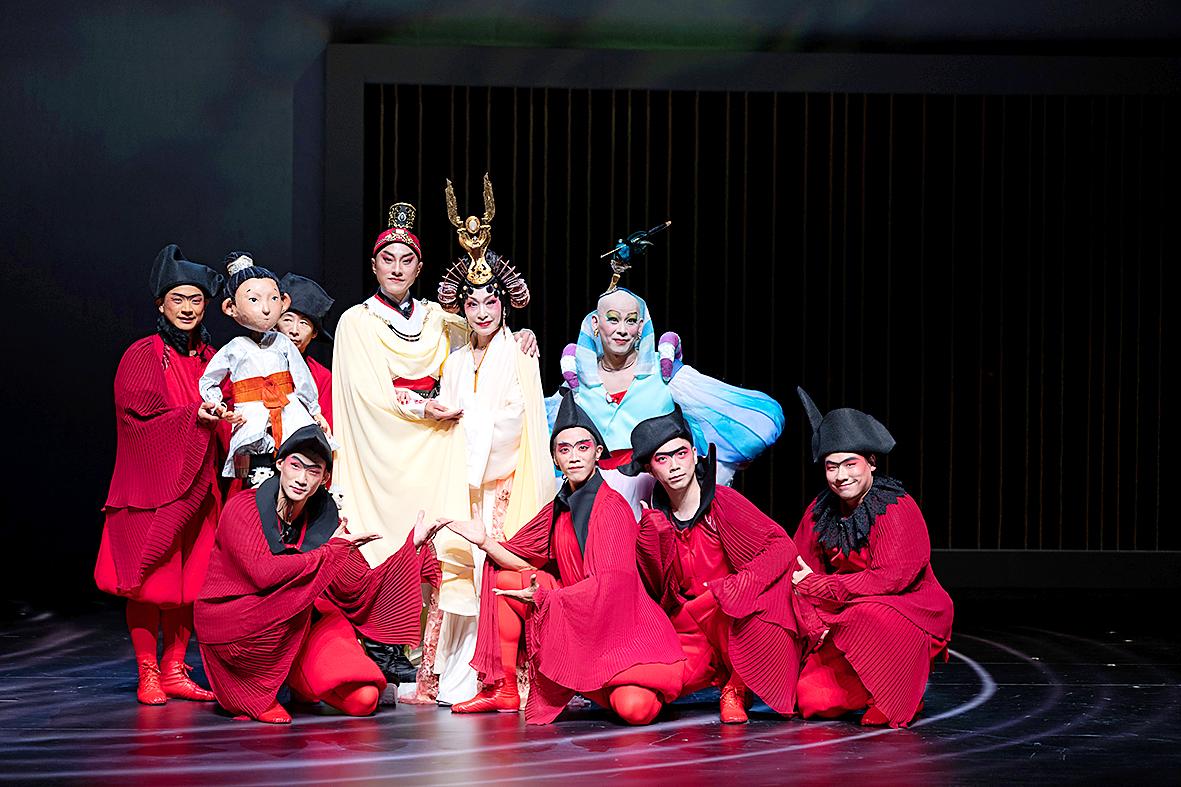The National Guoguang Opera Company’s (國立國光劇團) is premiering an R-rated show this weekend — well, for Peking Opera standards at least.
Phaedra/Phaedra — A Dream of Passion (極西之地有個費特兒) is the company’s second production drawing from the titular Greek tragedy, but company CEO Chang Yu-hua (張育華) says the upcoming performance is completely different from their 2019 collaboration with Singapore’s Siong Leng Musical Association (湘靈音樂社).
With an entirely Taiwanese creative force working with Dutch and Mexican drama consultants for over a year, the show fuses classic opera techniques and aesthetics with puppet theater, electronic sounds, visual installations and a Greek-styled chorus. The performance is in Mandarin with Chinese and English surtitles.

Photo courtesy of National Guoguang Opera Company
“We aim to use a Taiwanese perspective, Eastern aesthetics and the exquisite performance techniques of our actors … to present to the world a contemporary version of Phaedra that’s starkly different from what Western audiences are used to,” she says. “This production breaks national, stylistic, linguistic and cultural boundaries and is a fusion of East and West, tradition and modernity.”
There is no Phaedra in the opera; instead the story features a queen from another land who has similarly fallen deeply in love with her stepson. Sensually portrayed by Golden Melody-winning Chu An-li (朱安麗), the queen becomes entangled within her erotic fantasies and her kingdom’s power struggles, and is torn between acute desires in her dreams and the mounting pressures of reality.
Despite the emphasis on eroticism, none of it is overly explicit, although what’s shown is still considered R-rated for Peking Opera, which relies more on subtle motifs and imagery. Chu is seen biting her flowing sleeves in one scene, and in a bedroom scene with the king, she is seen lying face down on the stage and even takes off her shoe at one point. “That’s very daring for Peking Opera already,” Chang says.

Photo courtesy of National Guoguang Opera Company
The sensuality is further highlighted through modern dance, as the red-clad chorus pops up here and there, holding red sticks that “meld erotic love, punishment and violence all together,” the company’s press release states.
Many of the young production talent hail from non-opera backgrounds. There are three different clans (bird, bear and snake) in the opera, and designer Lee Yu-shen (李育昇) came up with distinct costumes that represent each animal, while balancing tradition and the flair of Haute Couture.
Composer Cheng I-liy (鄭伊里) is versed in Western and electronic music, and struggled with melding it with opera. Interestingly, since Peking Opera allows for much flexibility in terms of singing speed and diction, some of the electronic parts have to be played live to match the singing and traditional orchestra.

Photo courtesy of National Guoguang Opera Company
After the two showings in Taipei, the team will gather feedback and continue to refine the performance with Dutch production consultant Robert Van Den Bos and Mexican dramaturge Ximena Escalante for future international performances.
“Before when our company went abroad, it was completely from our point of view. This time, we really want to explore the new possibilities of traditional opera and to surpass our existing limits,” Chang says. “Is there only one way to represent tradition?”

On April 26, The Lancet published a letter from two doctors at Taichung-based China Medical University Hospital (CMUH) warning that “Taiwan’s Health Care System is on the Brink of Collapse.” The authors said that “Years of policy inaction and mismanagement of resources have led to the National Health Insurance system operating under unsustainable conditions.” The pushback was immediate. Errors in the paper were quickly identified and publicized, to discredit the authors (the hospital apologized). CNA reported that CMUH said the letter described Taiwan in 2021 as having 62 nurses per 10,000 people, when the correct number was 78 nurses per 10,000

As Donald Trump’s executive order in March led to the shuttering of Voice of America (VOA) — the global broadcaster whose roots date back to the fight against Nazi propaganda — he quickly attracted support from figures not used to aligning themselves with any US administration. Trump had ordered the US Agency for Global Media, the federal agency that funds VOA and other groups promoting independent journalism overseas, to be “eliminated to the maximum extent consistent with applicable law.” The decision suddenly halted programming in 49 languages to more than 425 million people. In Moscow, Margarita Simonyan, the hardline editor-in-chief of the

Six weeks before I embarked on a research mission in Kyoto, I was sitting alone at a bar counter in Melbourne. Next to me, a woman was bragging loudly to a friend: She, too, was heading to Kyoto, I quickly discerned. Except her trip was in four months. And she’d just pulled an all-nighter booking restaurant reservations. As I snooped on the conversation, I broke out in a sweat, panicking because I’d yet to secure a single table. Then I remembered: Eating well in Japan is absolutely not something to lose sleep over. It’s true that the best-known institutions book up faster

Though the total area of Penghu isn’t that large, exploring all of it — including its numerous outlying islands — could easily take a couple of weeks. The most remote township accessible by road from Magong City (馬公市) is Siyu (西嶼鄉), and this place alone deserves at least two days to fully appreciate. Whether it’s beaches, architecture, museums, snacks, sunrises or sunsets that attract you, Siyu has something for everyone. Though only 5km from Magong by sea, no ferry service currently exists and it must be reached by a long circuitous route around the main island of Penghu, with the